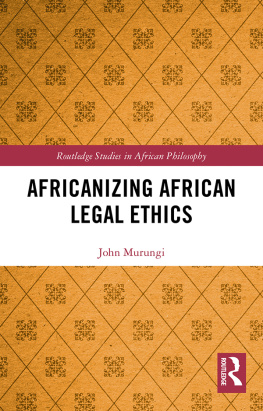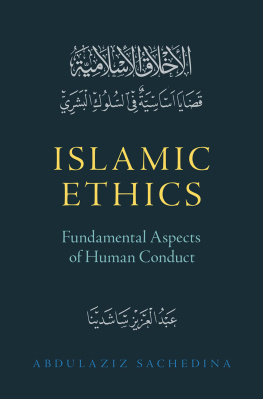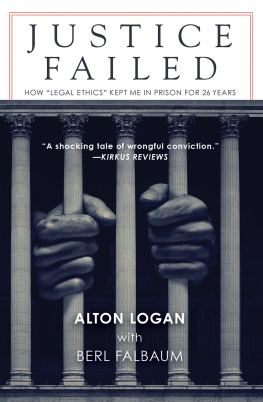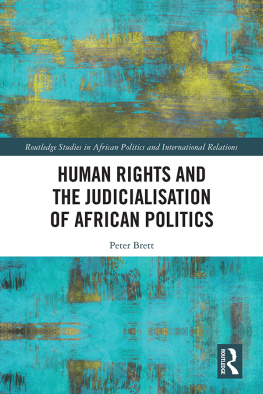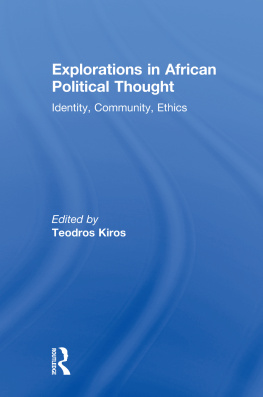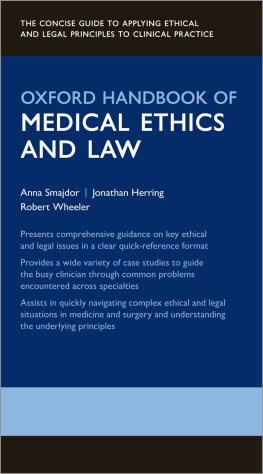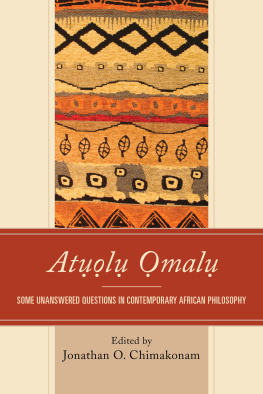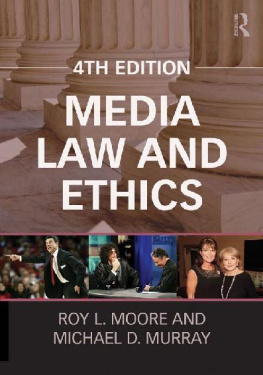Table of Contents
Guide
Print Page Numbers
Africanizing African Legal Ethics
This book is a philosophical inquiry into indigenous African legal ethics, asking what is African about African legal ethics?
Taking us beyond a geographical understanding of Africa, the author argues for an African legal ethics that is distinct from non-African African legal ethics which are rooted in Euro-Western constructions. De-silencing African voices on African legal ethics this book decolonizes the prevailing wisdom on legal ethics and broadens our understanding of how law in Africa bears on ethics in Africa or, conversely, on how ethics bears on law in Africa.
This book will be of interest to scholars of African philosophy, philosophy of law, and legal ethics.
John Murungi is a Professor in the Department of Philosophy and Religious Studies at Towson University, USA.
Routledge Studies in African Philosophy
African Philosophy and the Otherness of Albinism
White Skin, Black Race
Elvis Imafidon
Africanizing African Legal Ethics
John Murungi
Africanizing African Legal Ethics
John Murungi

First published 2020
by Routledge
2 Park Square, Milton Park, Abingdon, Oxon OX14 4RN
and by Routledge
52 Vanderbilt Avenue, New York, NY 10017
Routledge is an imprint of the Taylor & Francis Group, an informa business
2020 John Murungi
The right of John Murungi to be identified as author of this work has been asserted by him in accordance with sections 77 and 78 of the Copyright, Designs and Patents Act 1988.
All rights reserved. No part of this book may be reprinted or reproduced or utilized in any form or by any electronic, mechanical, or other means, now known or hereafter invented, including photocopying and recording, or in any information storage or retrieval system, without permission in writing from the publishers.
Trademark notice: Product or corporate names may be trademarks or registered trademarks, and are used only for identification and explanation without intent to infringe.
British Library Cataloguing-in-Publication Data
A catalogue record for this book is available from the British Library
Library of Congress Cataloging-in-Publication Data
A catalog record has been requested for this book
ISBN: 978-0-367-42708-5 (hbk)
ISBN: 978-1-003-00708-1 (ebk)
Typeset in Sabon
by Wearset Ltd, Boldon, Tyne and Wear
Contents
Wisdom is like a baobab tree; no one individual can embrace it.
African proverb
The study of legal ethics, whether African or non-African, ultimately takes us beyond the normal dos and donts in professional legal practice. It leads us to the study of ethics in general a study of how one lives or ought to live as a human being. In this more basic study of legal ethics, neither lawyers nor their professors are privileged. It is a study that is fundamentally open to all human beings for it is about all of them. It is a study in which the being of every human being is at stake. Accordingly, an authentic African legal ethics, an ethics referred to herein as African African legal ethics, has being African on focus. Africanizing African legal ethics aims at ensuring that this ethics is properly and accurately focused. The legal ethics that prevails in Africa today is Euro-Western. It diverts Africans from themselves; hence, the need for an Africanizing ethics if this diversion is to be halted. Colonialism in Africa exemplified this project of diversion. Anti-colonialism sought to halt it. Today, colonialism has morphed into neocolonialism. Hence the continued relevance of the Africanization of African legal ethics.
At the dawn of postcolonial Africa, there was widespread belief and expectation that Africanization of governments would take place. European colonial legislators and high-level European colonial administrators would be replaced by Africans. Moreover, since Europeans viewed themselves as white and socialized Africans into viewing them as such, and viewed and socialized Africans into viewing themselves as black, it was assumed that white personnel would be replaced by black personnel. Apparently, Africanization called for a replacement of white legislators and high-level administrators with black legislators and high-level administrators. Clearly, race was a central feature in this process. This book opposes this concept of Africanization. It is pointed out that Africanization is precisely what it is: Africanization. It is not blackenization. Africans are not black. They are what they are: Africans. Consequently, what is at stake in the process of Africanizing African legal ethics is, indeed, Africanizing it and not blackening it. If Africanization is needed, it is because African legal ethics is still plagued by racism. It is yet to be what it ought to be. The process of deracialization is yet to come to an end. It is also a process that is preeminently ethical in that it seeks to reassert the human right of Africans to be African. In the reassertion of this right, African African legal ethics has a prominent role to play. It can properly and appropriately play this role by articulating what this right is. This articulation displays the intrinsic human worth that the African shares with fellow human beings. The arena of legal ethics is projected as one of the theaters that ought to display this worth.
Legal ethics whether African or non-African addresses the phenomenon of being human. Addressing the phenomenon of being human is more than a matter of knowledge. Fundamentally, it is a matter of wisdom. To the extent that most of modern legal education shuns wisdom and has reduced legal science to being nothing more than an epistemological concern, little is accomplished in delving into what is essential about legal ethics and about ethics in general. Africanizing African legal ethics involves paying closer attention to the essential role played by wisdom in constituting and disclosing this branch of ethics.
In human history, wisdom has not always been left out in legal education. But today, for the most part, it appears to have no place in it. It is not what attracts teachers or students to law school. It is the knowledge of law and the knowledge of its application that has been the center of attraction. Consequently, it may come across as diversionary when wisdom is broached in a reflection on legal ethics as it is taught in law schools. However farfetched it may appear, attention to wisdom may enrich our understanding of law, our understanding of legal ethics and, hopefully, inform legal practice. It may not be obvious, but a critique of conventional legal education may enrich legal education. Society stands to benefit from such a critique for the welfare of society depends on how legal education is understood. Taking legal ethics seriously as an integral feature of legal education (not only by requiring students to take a course on legal ethics) may enhance the well-being of society.
There is what is subject to wisdom and there is what is subject to knowledge. Seekers of wisdom are not necessarily seekers of knowledge, and seekers of knowledge are not necessarily seekers of wisdom. One may be a seeker of both but seeking will be blind if one mistakes one for the other. One who mistakes one for the other will miss out on the truth of both. Our age an age that has increasingly fallen prey to the dictatorship of knowledge has left little room for wisdom. This is the situation in which we find ourselves as we seek to understand African African legal ethics. There are those who expect nothing more than the knowledge of this ethics and expect to be presented with such knowledge by the author. I want to disabuse them of this expectation. What follows is not exclusively a matter of knowledge. It touches on wisdom. Wisdom cannot be put on a calabash and passed around for consumption by the hungry. This kind of passage is a matter of knowledge and not a matter of wisdom. In African cultures, if wisdom is ever transmitted, transmission takes the form of a proverb. In the presence of a proverb, there is no teacher and there is no student. One is left to oneself to make sense of the proverb. The African baobab proverb that opens this work permeates the entire work and seeks to preserve it in it. A proverb loses its sense if it ceases to be what it is. What is truly proverbial remains proverbial. What is essential about African African legal ethics is proverbial and must be understood accordingly. It appeals to the proverbial in those who seek to understand it. Elemental understanding is and remains proverbial. The proverbial has its own lucidity proverbial lucidity.

